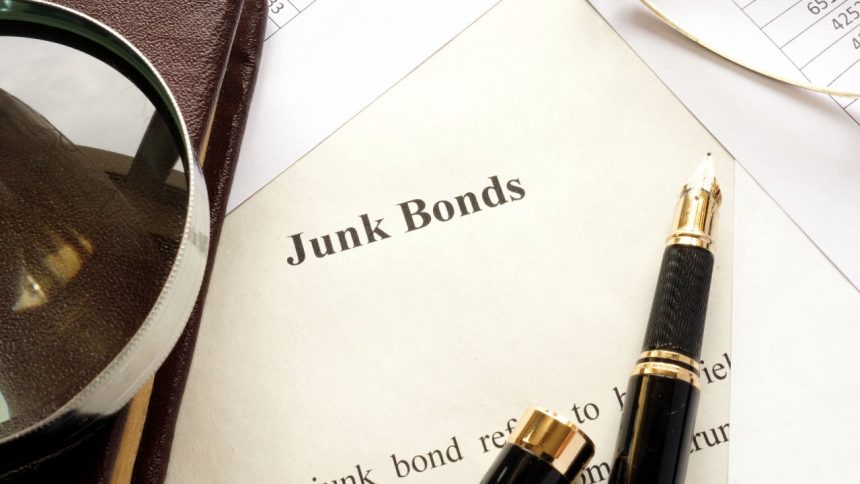Junk bonds are a high-risk investment, but they offer the potential for higher returns than investment-grade bonds. Junk bonds, also known as high-yield bonds, are best suited for investors who are willing to take on more risk in order to achieve higher returns.
Here are the key things to know about junk bonds and their pros and cons.
What are junk bonds?
Junk bonds are a kind of bond or debt investment that is rated below investment grade. The junk bond rating means that there is a greater risk that the issuer will default on the debt relative to investment-grade bonds. As a result of this increased risk, junk bonds offer a higher interest rate than investment-grade bonds, all else equal.
The quality of junk bonds can vary markedly. Despite the name, junk bonds may be issued by companies that are in reasonably good financial shape, though they’re often issued by those in mediocre or poor shape. The worst junk bonds are issued by companies that are struggling financially and have a high risk of defaulting or missing their interest payments.
In contrast, investment-grade credit ratings are given to companies that are considered to be the least likely to default on their debt. These companies are able to issue bonds that are rated BBB up to AAA on the Standard & Poor’s credit rating scale. Junk bonds, on the other hand, are rated below BBB and carry what is considered the highest risk of a company missing an interest payment (called default risk). Yet companies with junk bonds are not simply defaulting left and right, and higher-rated junk bonds can perform well for investors when part of a diversified bond portfolio.
So it’s important to understand that not all junk bonds are the same, even if some of them are truly quite risky.
Junk bond ratings
In order to help investors assess the risk associated with each junk bond, ratings agencies like S&P, Moody’s, Fitch and Morningstar DBRS have an established set of criteria.
Each agency uses different labels, but they all usually follow a similar pattern. For example, credit ratings in a “B” range suggest that bonds have a higher default risk compared to investment-grade bonds that are in the “A” range, but they technically aren’t the riskiest.
As you move lower on the scale, ratings that are a “CCC” or “C” indicate a higher risk of default. A “D” rating signals that the bond may have already defaulted and the issuer was unable to pay the borrower back.
| Moody’s | S&P | Fitch | Morningstar DBRS |
|---|---|---|---|
| Source: Corporate Finance Institute | |||
| Ba1 | BB+ | BB+ | BB (high) |
| Ba2 | BB | BB | BB |
| Ba3 | BB- | BB- | BB (low) |
| B1 | B+ | B+ | B (high) |
| B2 | B | B | B |
| B3 | B- | B- | B (low) |
| Caa1 | CCC+ | CCC+ | CCC (high) |
| Caa2 | CCC | CCC | CCC |
| Caa3 | CCC- | CCC- | CCC (low) |
| D | D | D | |
How to invest in junk bonds
Junk bonds can be purchased from a brokerage firm that buys and sells individual bonds. Investors can also buy a diversified portfolio of bonds through a mutual fund or ETF. In fact, several mutual funds and exchange-traded funds are dedicated to holdings of only junk bonds.
For investors looking to get into the junk bond game but who don’t have confidence in their own selection process, these funds offer an easy way to get access to junk bonds. You’ll enjoy the benefits of owning a diversified portfolio of junk bonds — less risk than owning just a few junk bonds — and you’ll likely enjoy a higher yield than you would with investment-grade bonds.
If you’re buying a fund, look at its long-term performance to see what returns you might expect. To get a sense of the fund’s volatility, check performance in each year. You can also check under the hood to see how much of the fund is invested in each credit grade, giving you an idea how risky the fund’s individual bonds may be. This perspective can help you determine whether a junk bond ETF may fit your needs.
Pros and cons of junk bonds
Junk bonds can be a good way to diversify your portfolio, but they’re not for everyone. Consider these pros and cons when deciding whether to invest.
Pros
- Higher yields. Junk bonds are more volatile than other bonds, but you can expect to receive higher interest rates from them than their investment-grade counterparts.
- Cash flow. Junk bonds, like bonds generally, are a good way to provide consistent cash flow for your portfolio. Bonds generally are not as volatile as stocks, so you’re less likely to experience permanent losses.
- Diversification. Bonds offer a way to diversify your portfolio away from just stocks, and they may perform differently in different market environments, potentially rising when stocks fall.
Cons
- Default risk. Junk bonds are riskier than investment-grade bonds because they’re issued by companies that are on less stable financial footing. They have higher default rates than investment-grade bonds.
- Liquidity. Junk bonds may not trade as frequently as investment-grade bonds, meaning you might have a harder time selling your bonds immediately or without taking a more substantial discount on the market price.
- Risk of individual bonds. Investing in individual junk bonds requires you to analyze the company, making investing in them riskier than simply buying a fund with a diversified collection of junk bonds.
Bottom line
Investing in individual junk bonds probably won’t appeal to the average person, but a junk bond fund can work for many investors, offering diversified exposure. Even still, before investing in junk bonds, it’s important to understand the risks and weigh them against the potential benefits.
— Bankrate’s Logan Jacoby contributed to an update of this article.
Read the full article here
















